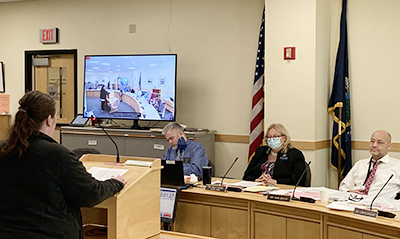Bargaining News
|February 13, 2024
Close the pay gap to eliminate staffing shortages in our state prisons

MSEA-SEIU Member Erin Feeney testifies in support of LD 2121, An Act to Address Chronic Understaffing of State Government Positions, sponsored by Representative Drew Gattine
Senator Nangle, Representative Stover, and members of the State and Local Government Committee. I here today to speak in support of LD2121, An Act to Address Chronic Understaffing of State Government Positions. My name is Erin Feeney. I am the Culinary Arts Instructor at the Southern Maine Women’s Re-Entry Center at the Maine Correctional Center in Windham. Working in corrections, for anyone who has never been impacted by the justice system or worked in it, may bring some TV shows or movies to mind. To shed some light on what may come to mind, I would like to simply say that I am proud to do the work that I do in the State of Maine because of the high ethical standards that have been set forth in law and in practice by my colleagues which I hold in high esteem. The Maine Correctional System is not the nightmare that may come to mind; our staff work hard to keep the residents in our care safe and provide them with opportunities to change, heal and better themselves in the spirit of bettering Maine and Mainers as a whole. Inside and outside of those walls.
It’s important to me that I make clear that I really love my job and I believe in what I do and that I am not here to complain, but I am here because I see the greater potential for the impact my work and the work of my colleagues has in store for Maine. My hope for the work we do is give residents at the facility the skills and confidence needed to recreate themselves, get a second chance and earn an honest living in an industry that plays an integral role in tourism and agriculture. Culinary is an inseverable aspect of both of those industries in fact. Both of which are hurting industries in staffing levels. My work helps train a workforce that could help generate more income for the state of Maine.
I love my job because I believe in what I do and how my work can benefit the state of Maine. For some background: I am grew up in Massachusetts and while visiting some childhood friends living in Portland, now Litchfield, I found it harder and harder to leave each time until I made the move back in 2016. One of the best decisions I have ever made. I bring this up to drive home the point that I am here in front of you today as a member of my Union, as someone who loves their job, and as someone who loves the state of Maine.
When it comes to speaking on staffing shortages in corrections, I think of the times where I have volunteered to cover for Correctional Officer cooks in my facility. I will be covering two vacation days next week. For me, that is not a harrowed story and I look forward to working in that kitchen with those ladies, but staffing shortages period are disconcerting when I look at states like Wisconsin. According to the New York Times, some Prisons in Wisconsin are at a staffing ratio of 10 staff to 900 inmates, and staffing shortages are something that was brought to the attention of elected officials in 2015. The situation in Wisconsin right now means no visitors for inmates, which when you think about it, that means their innocent families are paying for their crimes. It means constant lock downs, so no fresh air, no exercise. This is cruel and unusual and will not be helpful to anyone. If we as a state have ANY means to address staffing shortages BEFORE they become National news headlines, then do we not have an obligation to do so? Before it’s too late?
Lastly, I want to bring up the impact of staffing shortages in terms of what I DON’T see. What I don’t see is what happens when my valued colleagues go home. Working in Corrections takes an emotional toll, even when abundantly staffed. According to the Vera Institute Corrections Officers suffer a higher rate (in comparison to a national average of non-corrections staff) of depression at a rate of 25% compared to 7%, a higher rate of PTSD 27% to 4%, a higher rate of suicide 7% compared to 5% and a life expectancy of 59 years old compared to a national average of 75. If there is a means to keep these myself and my hard-working vulnerable colleagues who work in the dangerous, dismal but crucial component of a fully functioning democracy, then you have a moral obligation as an American and as a Mainer to do so. I ask that you fight for and support LD2121.
Thank you for your time.
Erin Feeney